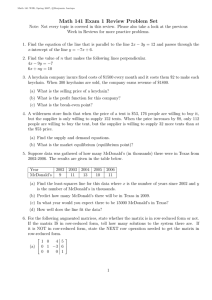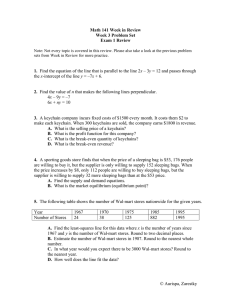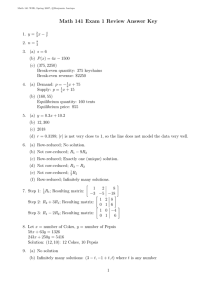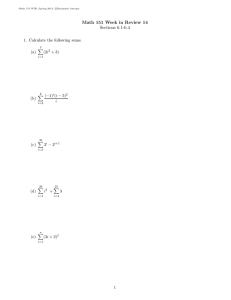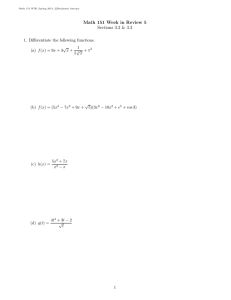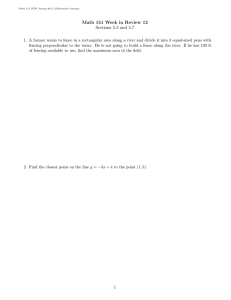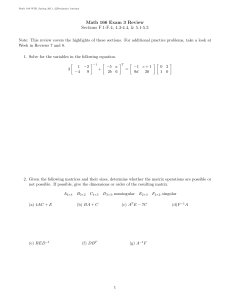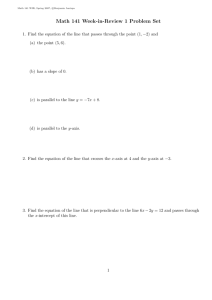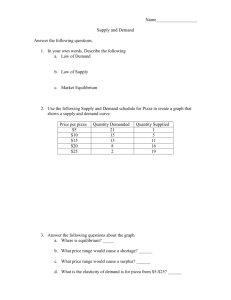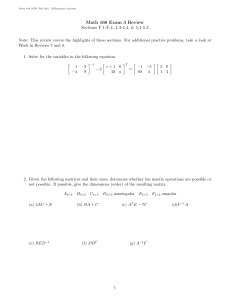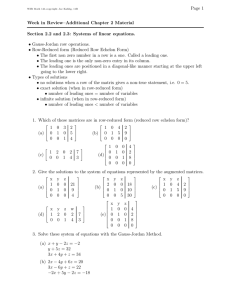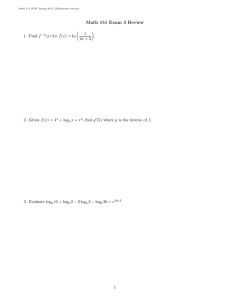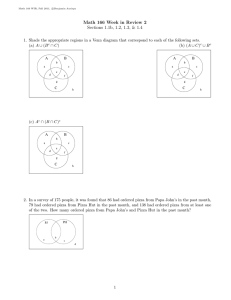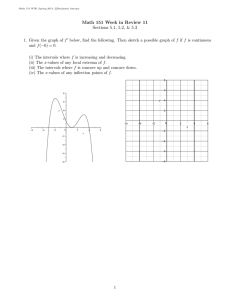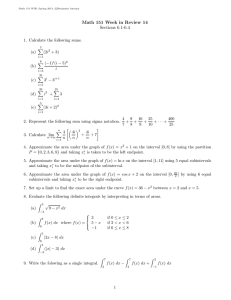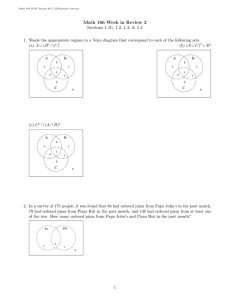Document 10413149
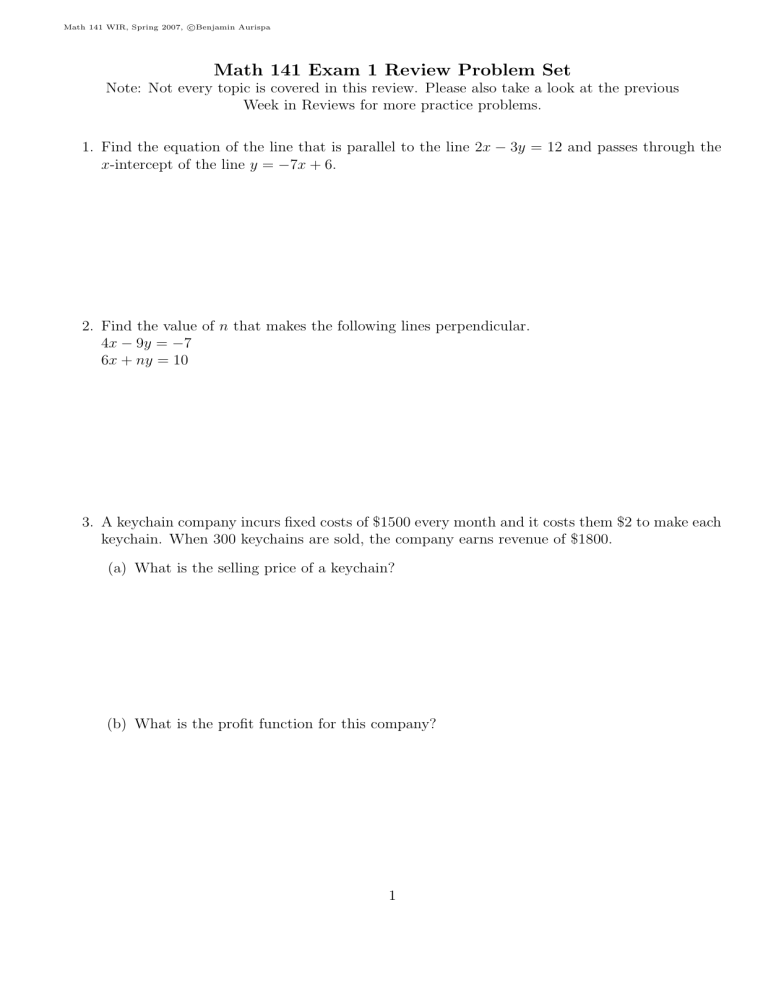
Math 141 WIR, Spring 2007, c Benjamin Aurispa
Math 141 Exam 1 Review Problem Set
Note: Not every topic is covered in this review. Please also take a look at the previous
Week in Reviews for more practice problems.
1. Find the equation of the line that is parallel to the line 2 x − 3 y = 12 and passes through the x -intercept of the line y = − 7 x + 6.
2. Find the value of n that makes the following lines perpendicular.
4 x − 9 y = − 7
6 x + ny = 10
3. A keychain company incurs fixed costs of $1500 every month and it costs them $2 to make each keychain. When 300 keychains are sold, the company earns revenue of $1800.
(a) What is the selling price of a keychain?
(b) What is the profit function for this company?
1
Math 141 WIR, Spring 2007, c Benjamin Aurispa
(c) What is the break-even point?
4. A wilderness store finds that when the price of a tent is $53, 176 people are willing to buy it, but the supplier is only willing to supply 152 tents. When the price increases by $8, only 112 people are willing to buy the tent, but the supplier is willing to supply 32 more tents than at the $53 price.
(a) Find the supply and demand equations.
(b) What is the market equilibrium (equilibrium point)?
2
Math 141 WIR, Spring 2007, c Benjamin Aurispa
5. Suppose data was gathered of how many McDonald’s (in thousands) there were in Texas from
2002-2006. The results are given in the table below.
Year 2002 2003 2004 2005 2006
McDonald’s 9 11 13 10 11
(a) Find the least-squares line for this data where x is the number of years since 2002 and y is the number of McDonald’s in thousands.
(b) Predict how many McDonald’s there will be in Texas in 2009.
(c) In what year would you expect there to be 15000 McDonald’s in Texas?
(d) How well does the line fit the data?
6. For the following augmented matrices, state whether the matrix is in row-reduced form or not.
If the matrix IS in row-reduced form, tell how many solutions to the system there are. If it is NOT in row-reduced form, state the NEXT row operation needed to get the matrix in row-reduced form.
(a)
1 0 4 5
0 1 − 3 6
0 0 0 1
(b)
1 9 0 6
0 1 0 7
0 0 0 0
(c)
1 0 − 7
0 1 8
0 0 0
3
Math 141 WIR, Spring 2007, c Benjamin Aurispa
(d)
1 0 6
0 1 2
0 1 5
(e)
"
1 0 4
0 3 9
#
(f)
"
1 0 1 1
0 1 3 2
#
7. Use the Guass-Jordan method to get the following matrix in row-reduced form.
"
4 8 32
− 3 − 5 − 18
#
8. Kristina drinks both Coke and Pepsi. A 20 oz bottle of Coke contains 58 mg of Caffeine and
243 calories. A 20 oz bottle of Pepsi contains 63 mg of Caffeine and 250 calories. In a given week, Kristina drinks enough Cokes and Pepsis to take in 1326 mg of Caffeine and 5416 calories.
How many Cokes and Pepsis did Kristina drink that week?
4
Math 141 WIR, Spring 2007, c Benjamin Aurispa
9. Solve the following systems of equations. If there are infinitely many solutions, make sure to parameterize the solution.
(a) 10 x − 8 y = 6
− 15 x + 12 y = 20
(b) 2 x + y + z = 5
4 x + 6 z = 14 + 2 y
− 6 x + 3 y − 9 z = − 21
10. Solve for the variables in the following equation.
3
"
1 − 2
− 4 9
#
− 1
+
" − 5 a
2 b 6
#
T
=
" − 1 c + 1
9 d 20
# "
0 2
1 0
#
5
Math 141 WIR, Spring 2007, c Benjamin Aurispa
11. John is throwing a Super Bowl party and wants to oder pizzas. He finds that Papa John’s charges $6 for a small pizza, $9 for a medium pizza, and $12 for a large pizza. Pizza Hut charges
$5 for a small pizza, $10 for a medium pizza, and $13 for a large pizza. This information is summarized in the following matrix.
PJ PH
S 6 5
A=
M
9 10
L 12 13
If John wants to order 5 small, 3 medium, and 6 large pizzas, find a matrix B so that when multiplied with A will give the total cost of his order if he orders from Papa John’s or if he orders from Pizza Hut. Then do the matrix multiplication.
12. Given the following matrices and their sizes, determine whether the matrix operations are possible or not possible.
A
2 × 4
B
3 × 2
C
4 × 3
D
3 × 3
E
2 × 3
(a) 4 AC + E
(b) BA + C
(c) A T E − 7 C
(d) BED
(e) DB T
6
Math 141 WIR, Spring 2007, c Benjamin Aurispa
13. Suppose there are 3 major airlines that fly out of Houston: Southwest, Delta, and American.
A Southwest flight holds 135 people, a Delta flight holds 160 people, and an American flight holds 148 people. On a given day, a total of 88,683 people flew out of Houston. There were 3 times as many Southwest flights as Delta flights, and the number of American flights was half the number of Southwest and Delta flights combined. How many flights out of Houston were there for each airline?
(a) Set up this problem.
(b) Write the system of equations as a matrix equation AX = B .
(c) Solve the matrix equation using matrix inverses.
7
Math 141 WIR, Spring 2007, c Benjamin Aurispa
14.
(Note: This problem is from 2.7 which all instructors may not cover.) A simple economy consists of
3 industries: Agriculture, Transportation, and Service. The production of 1 unit of agricultural products requires the consumption of 0.2 units of agricultural products, 0.1 units of transportation, and 0.1 units of service goods. The production of 1 unit of transportation requires the consumption of 0.3 units of agricultural products, 0.4 units of transportation, and 0.3 units of service. Finally, the production of 1 unit of service goods requires the consumption of 0.2 units of agricultural products, 0.1 units of transportation, and 0.3 units of service.
(a) Find the Input-Output matrix A .
(b) Find the gross output of goods needed to satisfy consumer demand for 790 units of agricultural products, 445 units of transportation, and 205 units of service goods.
(c) Find the value of goods consumed in the internal process of production in order to meet the above gross output.
8
